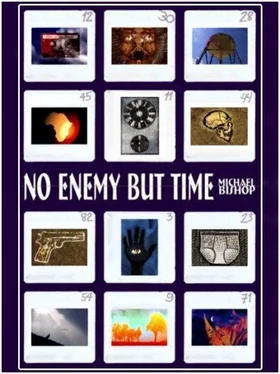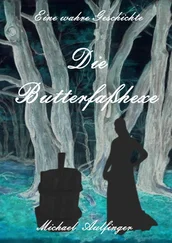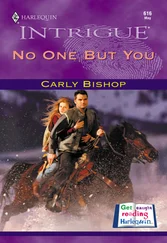The habilines—humanity’s ancestors—were singing.
* * *
After ten or fifteen minutes the singing stopped. Although I should have returned to the lake, I kept waiting for it to resume. Yesterday, apparently, I had arrived too late to hear it. The impression this singing left on me—a kind of awe, a tingling in the nerve ends—took a while to wear off. Eventually, though, it gave way to the engines of appetite, my nagging hunger.
I kicked the remains of my fire off the kopje, stamped them down to keep them from starting a grass fire, and headed for a stand of fig trees to the east. In the red-oat grass bordering this glade a flock of guinea fowl strutted. To test my survival skills, I took the time to trap one of these birds noiselessly, after the fashion of the !Kung, and by stealth and patience managed to accomplish this feat without scaring off the entire flock until my trap had actually sprung. Even Babington could not have done better.
Using fingers and pocketknife, as the old Wanderobo had taught me, I plucked, dismembered, and cleaned the bird, then fell to and devoured its flesh raw. My time in Lolitabu had prepared me for this primitive approach, and I actively enjoyed my meal, the first real one since my arrival. A dry rivercourse divided the fig thicket, but I found water by scooping out a hole in the arroyo’s sandy bottom and watching underground moisture seep slowly into view. Down on my hands and knees, spurning the use of my water-purification tablets, I drank directly from the stream bed, then washed the sticky blood of the guinea fowl from my face and fingers.
After that I sponged myself down with yesterday’s T-shirt and dug into my shaving bag for my toothbrush, razor, and blades. In retrospect, much of this attention to dress and cleanliness seems ridiculous to me, but in spite of my survival training I had not yet broken completely free of the twentieth century. My most sinful indulgence that morning was changing my underwear. This feat (although detailing it may invite ridicule) I accomplished without taking off my chukkas, for it seemed imperative to me to be able to run if danger threatened. I had trained barefoot with Babington, but I still did not trust myself to negotiate a landscape littered with acacia thorns. Keeping my shoes on meant stretching the elastic around the leg holes of my briefs, but that was a lesser evil than having to flee a leopard in my stocking feet. Actually, I was more worried about having only two packages of Fruit of the Looms left in my pack, and I devoted a good ten minutes to washing out yesterday’s pair in the stream bed. These I placed on a euphorbia bush to dry.
I probably should have spent my sunrise on the shores of Lake Kiboko. If Kaprow had dropped the scaffold to me at dawn, I had not been there to witness the event or to confirm for him the fact of my continuing existence. However, I could not convince myself that I had missed anything, and the singing of the habilines was a phenomenon worth at least another day in the Pleistocene. Our contingency plan, along with our matched set of transcordions, had temporarily broken down. White Sphinx would find a way to retrieve me, surely, but for the moment I had to hold my own.
As I fetched my Fruit of the Looms from the euphorbia on the edge of the glade, I saw marching single-file across the savannah, north-northeast toward Helensburgh, a pack of hyenas. Prodigious creatures, they were good, if frightening, examples of the extinct Pleistocene megafauna. I froze, hoping that some of the laughter I had heard intermittently all night—the nerve-racking cachinnations of brigands—had signified a successful hunt.
I counted fifteen slope-backed hyenas in all, each of the eleven adults as big as the biggest male lion. It being July, the wind was blowing gently from the southwest, from the hyenas to me, and upon it I could smell the unmistakable tang of carrion. The animals’ coarse, yellow-brown pelts were marbled with interlocking swirls of black, and their unlovely faces bespoke the smugness of—Ngai be praised—satiety. That, in them, was a condition I could gratefully stomach.
Alistair Patrick Blair often said of hyenas, “I wish the bloody buggers had never been born.” This giant variety—although he had obviously never had the chance to see one—he especially detested. Their great crime, in his eyes, was their nearly wholesale disposal of the bones of their two-legged contemporaries.
By this indiscriminate feeding behavior, they had eradicated from the fossil record an invaluable store of information about human origins. My distaste for hyenas was less lofty: they killed as well as scavenged, and they stank.
When the hyenas had gone, I gathered up my gear, including my freshly laundered shorts, and struck off into the bush to establish a home base much closer to Helensburgh.
* * *
Once, that second morning, I thought I saw bipedal creatures roaming the veldt to the north, as if stalking prey, but the heat haze and the intervening herds of antelope may have played tricks on my vision.
A short time later I arrived at the head of the Minids’ V-shaped clearing and squatted like a breakwater between the fingers of forest pointing into the savannah. The Minids saw me at once, and three or four children who had been tumbling in front of the huts together stopped to watch what I was doing. An elderly male hooted to his younger compatriots in alarm. Struggling to control the pounding of my heart, I dug nonchalantly at the grass. I examined individual sprigs, turned over rocks, sniffed my fingers appraisingly.
Quite by accident, a fortunate one, I discovered a scorpion. It lifted its stinger and moved on me in immemorial scorpion fashion. Meanwhile, I knew, the Minids had formed an attack group of their own and were advancing on me with upraised clubs. Deliberately ignoring the habilines, I made a show of rapidly striking the scorpion with my knuckles—a technique much beloved of baboons—until the odious little beastie was so dazed that a flick of my finger capsized it to its back. Next, I removed the stinger, along with the poison sac, and killed the scorpion with a squeeze.
By this time every Minid in Helensburgh was watching me. In fact, Helen had joined the males in their cautious war party. I saw her, club in hand, tiptoeing toward me along the left-hand side of the clearing.
The males were spread out in a sagging U, moving slowly but methodically forward. I tried not to betray my nervousness.
Making an involuntary moue, I put the best face I could on the eating of the scorpion. The idea was to demonstrate to my bipedal brethren that, all appearances to the contrary aside, I was one of them, a bona fide grass-grubbing, arachnid-crunching, down-to-earth habiline. Further, if permitted to, I could contribute to their food-gathering industry, as witness my success in finding the scorpion.
Nothing doing.
The menfolk closed on me more menacingly, the hair on their shoulders erect. Helen’s intentions appeared no more friendly than those of her male counterparts. She fell in behind a macho hombre with a tangled black beard and the astonishing tonsorial discrepancy of a Thin Man mustache. This dude, the largest in the band, was almost certainly the Minids’ alpha Romeo, for which reason I had already mentally dubbed him Alfie. Helen, however, had at least an inch in height on him, and it was interesting to note that she had not waited for his okay to join their assault group, a fearsome juggernaut of nationalistic feeling.
The taste of scorpion acrid on my palate, I stood up. I raised my hands. Because I was taller than the herbivorous australopithecines with whom they shared a portion of the bush-and-savannah habitat, the Minids stopped. Further, I was as nimble on my feet as the habilines. Come the crunch, fear and adrenaline fueling me to victory in spite of my chukka boots, I felt sure I could do a Jesse Owens on even their fleetest and most tenacious sprinter. For now, though, I spread my arms and showed them I was holding neither club nor stone.
Читать дальше



![Ally Carter - [Gallagher Girls 01] I'd Tell You I Love You But Then I'd Have to Kill You](/books/262179/ally-carter-gallagher-girls-01-i-d-tell-you-i-lo-thumb.webp)








